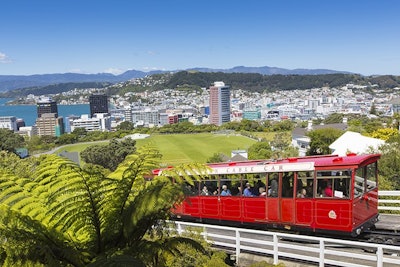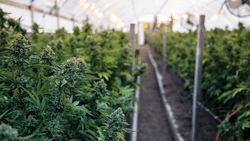
Colin Hogg will be the first to tell you that New Zealand has a long way to go before Parliament moves forward with cannabis reform. The journalist recently published The High Road, a book that covers his travels to the U.S. to see what legal cannabis markets look like.
“That was the impetus for [the book], really—this frustration,” Hogg tells Cannabis Business Times. “We’re sitting, watching the rest of the world liberalize, while we sort of fiddle about."
With historically high rates of cannabis use nationwide, according to the United Nations Office on Drugs and Crime, New Zealand tends to mirror its geographic neighbor, Australia, in its political and legal stances on the plant. A socially progressive population is held back, Hogg asserts, by a Parliament that lists toward the conservative side of the spectrum on the issue of cannabis.
“In New Zealand, where marijuana is the third most popular drug after alcohol and tobacco—and it’s catching up fast on tobacco—it’s illegal to grow it, sell it, own it, smoke it or hold it,” he writes in his book (although cultivators may grow cannabis for research purposes). “Even the ill have been generally denied it, though there is now some reluctant loosening of those rules.”
In January, the ruling Labour Party introduced a bill that would establish a medical cannabis scheme (with the criteria for access and standards still to be determined) and exclude terminally ill patients from prosecution in the interim. Then, in July, the National Party introduced a competing bill that moderately expanded on what a medical cannabis marketplace might look like in New Zealand. "The government has said it will increase access now and leave it to officials to think through the controls and the consequences later. That's typical of this government but it's not acceptable. So, we're putting forward a comprehensive alternative,'' National leader Simon Bridges said.
And yet, as the country’s major political parties duke it out over alternative cannabis marketplace theories, their constituents are gripped by a surge in “synthetic cannabis use,” as The Guardian reports. Dozens of New Zealanders have died in the past year by smoking legal products designed around chemical analogs of cannabis.
“I don’t know why it’s called ‘synthetic cannabis.’ It’s really got nothing to do with cannabis at all,” Hogg points out.
Nonetheless, the New Zealand government allows those products and continues to restrict anything relating to the cannabis plant—other than 98-percent CBD products. Patients can access medical cannabis products now, but they require support from a specialist and approval from the Ministry of Health before being able to access products.
Hogg, armed with his country’s frustration, traveled across the Pacific Ocean to see how the U.S. is adapting to its cannabis reform experiment.
“It did seem from here that America—now, I’m not being rude—but of all places, it was sort of rushing ahead with this,” Hogg says. “When you go there from here, it’s a bit of a mind-spin going into a shop and just buying it. It’s bizarre.”
Along the way, over the course of two trips, Hogg visited California, Oregon, Washington and Colorado. In Denver, he visited as a guest of a local cannabis tourism agency, took in the sights and stopped by Lightshade, one of Colorado’s dispensaries.
Read Cannabis Dispensary’s guest interview with Lightshade’s Steve Brooks
Hogg says that cannabis tourism to the U.S. hasn’t taken off in New Zealand entirely, noting instead that there’s just too much work to do in his own country. NORML has had boots on the ground since 1979, and the cannabis reform organization is urging patients, caregivers and voting residents across New Zealand to voice their support for legislative change.
“We need the parties to work together now to fix the proposed [medical cannabis] legislation and give patients urgent protection,” said Rebecca Reider, a patient representative on NORML New Zealand’s board. “While they squabble, patients are still getting busted—or dying without medicine.”
Across the Tasman Sea, Australian medical cannabis patients are finding little ease in their own access to the plant. Australia’s federal government formally legalized medical cannabis in 2015, though the country’s nascent industry has kept its eyes on the horizons of a burgeoning export market—more so than on its domestic businesses and patients.
As Australia’s industry continues to grow and mature, lawmakers in New Zealand will no doubt keep an eye on how liberal market policies may impact their own country.
As part of a coalition agreement with the ruling Labour Party, New Zealand’s Green Party was told that a nationwide referendum on the question of adult-use cannabis legalization would be put before voters sometime by the 2020 election. The result of that vote will give Parliament a good sense of what its constituents would like to see in their country; both the major parties, Labour and National, have now said the outcome of the referendum will likely be binding and they will legislate accordingly.
Top photo courtesy of Curioso Photography/Adobe Stock
This article has been updated from an earlier version to further clarify several facts about the Labour and National party bills.



























